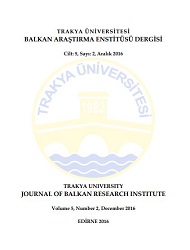BULGARİSTAN’DAN TÜRKİYE’YE GERÇEKLEŞEN 1950-1951 GÖÇÜNÜN NEDENLERİ
THE REASONS OF 1950-1951 IMMIGRATION TOWARDS TURKEY FROM BULGARIA
Author(s): İbrahim KamilSubject(s): Ethnohistory, Nationalism Studies, Sociology of Culture, Post-War period (1950 - 1989), History of Communism, Migration Studies, Ethnic Minorities Studies, Sociology of Politics
Published by: Trakya Üniversitesi Balkan Araştırma Enstitüsü
Keywords: Bulgaria; Turks of Bulgaria; Immigration; Second World War;Turkey
Summary/Abstract: Bulgaria joined the Second World War on the side of Germany and was defeated. The Red Army of Russia, which is among the victors of the war, occupied the country and founded a socialist government close to itself. The Patriotic Front government preferred “the Soviet model” in its domestic and foreign policy. The government applied the policies of pressure, persecution and forced immigration to the minorities in its country, particularly to the Muslim Turks. The Turks, living near Turkish border of Bulgaria were exiled to interior regions by the order of Stalin and those, who resisted to these policies, were forced migration to Turkey in 1950-1951 years. Bulgarian government applied assimilation policies towards Turks staying in the country in the context of the secret decisions, taken by the Bulgarian Communist Party Central Committee Politburo and tried to create “a socialist society with one-nation”. In this study, the policies towards Turks in Bulgaria and the reasons of their immigrations to Turkey have been analyzed on the basis of official documents.
Journal: Balkan Araştırma Enstitüsü Dergisi -Trakya Üniversitesi
- Issue Year: 5/2016
- Issue No: 2
- Page Range: 31-65
- Page Count: 35
- Language: Turkish

